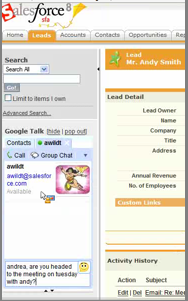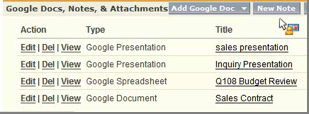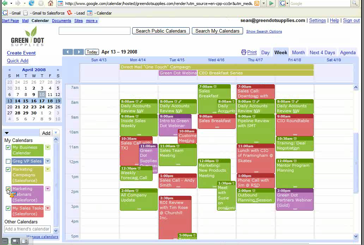 On Monday, Google and Salesforce are officially announcing the complete integration of Google Apps (Docs, Calendar, Gmail, and Gtalk) and Salesforce’s online enterprise apps. TechCrunch broke the story last week. Now we have some more details. Google Apps will get exposure to Salesforce’s one million paying business subscribers, and Salesforce in turn will become more attractive to the “tens of millions” of business users on Google Apps.
On Monday, Google and Salesforce are officially announcing the complete integration of Google Apps (Docs, Calendar, Gmail, and Gtalk) and Salesforce’s online enterprise apps. TechCrunch broke the story last week. Now we have some more details. Google Apps will get exposure to Salesforce’s one million paying business subscribers, and Salesforce in turn will become more attractive to the “tens of millions” of business users on Google Apps.
 Google is in effect becoming Salesforce’s productivity suite. Google documents, spreadsheets, and presentation can be created from within Salesforce’s CRM application. GTalk works as the de facto instant messenger within Salesforce. With one click, sales people who use Gmail can send any email correspondence with potential or existing customers to Salesforce, where it becomes recorded as part of the sales cycle. Sales events and marketing campaigns can be overlayed onto a Google Calendar (see screen shot below), as well as colleague’s schedules for figuring out convenient meeting times.
Google is in effect becoming Salesforce’s productivity suite. Google documents, spreadsheets, and presentation can be created from within Salesforce’s CRM application. GTalk works as the de facto instant messenger within Salesforce. With one click, sales people who use Gmail can send any email correspondence with potential or existing customers to Salesforce, where it becomes recorded as part of the sales cycle. Sales events and marketing campaigns can be overlayed onto a Google Calendar (see screen shot below), as well as colleague’s schedules for figuring out convenient meeting times.
The Google productivity apps are free unless a company wants to upgrade to the premier edition (which includes added security and management features) for $5/user/month. By summer, Salesforce will be reselling the premier edition itself for twice as much—$10/user/month—and will throw in telephone support and put everything on one bill.
Salesforce founder and CEO Marc Benioff tells me that he is embracing Google as another way to undercut Microsoft:
You’ve seen what we have been doing is slowly integrating all of our services with theirs. Certainly the enemy of my enemy is my friend, which makes Google my best friend. I have spoken with a lot of customers who want to get off of Microsoft Word.
 Of course, Microsoft’s desktop cp-Office apps are threatened long-term by Google Apps, and its own CRM software for small businesses is threatened by Salesforce. But why didn’t Salesforce simply build its own Web-based productivity apps as so many others are doing? Says Benioff:
Of course, Microsoft’s desktop cp-Office apps are threatened long-term by Google Apps, and its own CRM software for small businesses is threatened by Salesforce. But why didn’t Salesforce simply build its own Web-based productivity apps as so many others are doing? Says Benioff:
I really didn’t want to compete against Google in an area they consider core.
Better to gang up against Microsoft together. Now he has the leading Web-based productivity suite baked into Salesforce. But that brings up another question. If Google and Salesforce are so well suited for each other, why doesn’t Google just buy Salesforce? It could accelerate the growth of Google’s enterprise business and make it a little bit less reliant on advertising dollars (since Salesforce charges monthly subscriptions). When I put this notion to Benioff, he punted it back to Google:
You should give them a call and ask them about that.
Something tells me I won’t get a straight answer from them either. But it is obvious that Google is thinking along the same lines when it comes to enterprise apps in the cloud. Just last week, Google launched its own marketplace for enterprise apps, which is similar to Salesforce’s AppExchange. Ultimately, though, how many different Web platform companies can co-exist? A Google-Salesforce combo could sew up the Web platform for enterprise apps.
